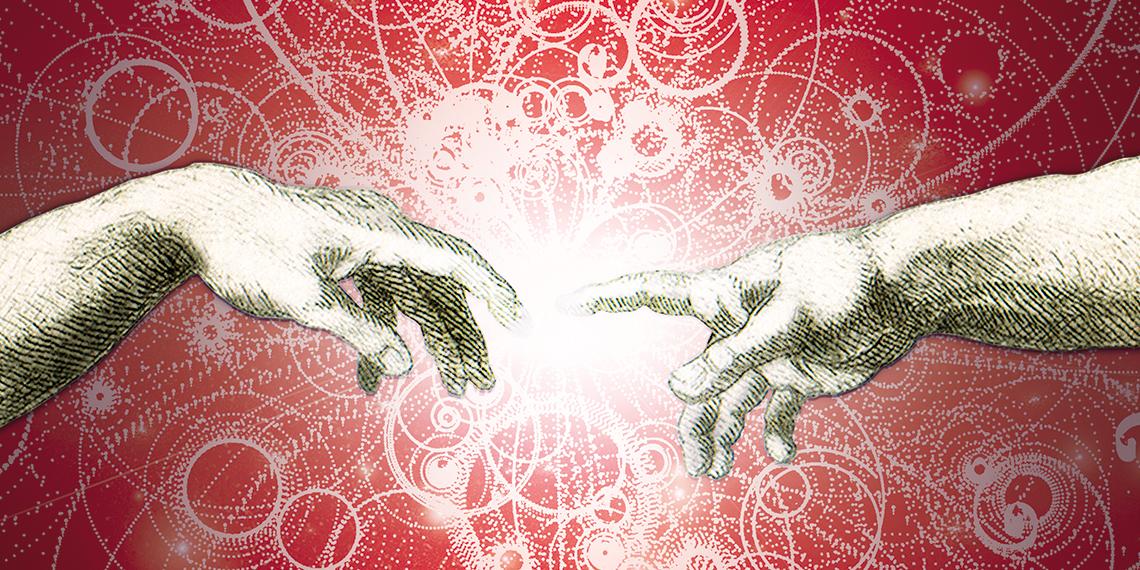The first seven days

Scientist and pastor Dr Nick Goodwin provides a fascinating insight into the first seven days of the Universe …
Genesis 1 is a magnificent piece of literature, its language spare and economical, its elevated style, similar to poetry or a hymn, beautifully matched to the power and universal significance of its message. And what a message! Unlike any number of ancient pagan myths of creation, full of tumultuous divine warfare, Genesis 1 speaks of a Creator who is utterly unrivalled, boundless in wisdom, and source of ‘every good and perfect gift’ (James 1:17).
Unfortunately, the foundational lessons of this chapter are frequently overshadowed by debates—sometimes acrimonious—about how Christians should understand the seven days of creation, and their relationship to modern science. Among Christian teachers and scholars who affirm the inerrant truth of the Bible, a number of positions are held. Some believe Genesis reports on an historical week of 24-hour days. Others take the seven days as a figurative or artistic representation of God’s creative activity. Still others have proposed something between these two poles. For instance, the idea that each day is a long age has widespread support, while John Lennox has suggested there are six actual 24-hour days, but that the days might be separated by long ages.
Why seven days?
In our scramble to determine whether God’s creative week should be understood historically, figuratively, or in some other way, we Christians often forget to ask a simple but profound question: Why seven days? After all, if this chapter is understood literally, we must admit God in his power could have created instantaneously (in fact, several early figurative interpreters, such as Origen and Augustine, actually believed in instantaneous creation). Why does God take so long, continually putting off till tomorrow what he could have achieved in one day?
If the chapter is understood figuratively, it obviously follows that the seven days will likely have a symbolic significance; but even literalists must ask themselves about the deeper meaning of a week-long creation.
Why seven days? Drawing on the expertise of biblical scholars such as John Walton, Richard Middleton and Gordon Wenham, the best place to begin answering this question is with days six and seven—the climactic days in the story of creation.
There are several indications in the text that these days have special importance. One of these pointers is the general structure of the six days of activity. As the table opposite shows, these six days can be divided into two sets of three: first there are three days of ‘forming’ or separating, then there are three days of ‘filling’ that correspond to the first three days. For instance, day and night are created on the first day, while on day four the light-bearers ‘fill’ the night and the day. There is a clear progression from the first set to last set.
Also, there is progression within each set, where days three and six contain double activity. On day three, both dry land and plants are created; on day six, both land animals and humanity are created.
The overall impression is of step-wise progress culminating in day six. The English translation traditionally reads ‘the first day’ (Gen 1:5), ‘the second day’ (Gen 1:8) and so on. In fact, the original Hebrew provides an important pointer: a literal translation would be ‘a first day’, ‘a second day’, and so on, up to ‘the sixth day’ (Gen 1:31) and ‘the seventh day’ (Gen 2:2,3). In such a carefully crafted text, this seems significant.
Why did God rest?
What then are the key lessons we learn from these two important days? Let’s start with the seventh day. This is a day on which God rests (Gen 2:2). We may be puzzled by the idea of God resting, as though he was tired. But for the Israelites the connotations were probably different.
Importantly, according to the Bible, divine ‘rest’ is associated with temples. For instance, in Psalm 132:14, God says of Jerusalem and the temple: ‘This is my resting place forever; here I will dwell’. I believe the inference we should draw from this connection between temples and resting, is that Genesis 1 is describing the creation of the universe as a kind of vast temple—a divine resting place where God is worshipped.
As God says in Isaiah 66:1–2: ‘Heaven is my throne, and the earth is my footstool; what is the house that you would build for me, and what is the place of my rest?’ The universe is the true temple of the Lord—earthly temples like the tabernacle and Jerusalem temple are mere miniature facsimiles.
The seven-day pattern for creation parallels the inauguration processes for both the tabernacle and the Jerusalem temple, which were associated with seven-day feasts (Exodus 29:35;
1 Kings 8:65). Some limited archeological evidence suggests such seven-day temple inaugurations may have also been practiced by other ancient near-eastern peoples.
The number seven is linked to temples throughout scripture. For instance, God’s instructions to Moses for building the tabernacle were revealed in a series of seven speeches, the last of which is about Sabbath observance.
I believe these parallels reveal the primary significance of the seven days—the creation week is a festive inauguration of God’s universal temple.
The holiness of the seventh day (Gen 2:3) makes perfect sense in light of the idea that the universe is a place for God’s worship. When something is designated as holy, that means it is set aside for God and his service. This is what happens to the seventh day.
Interestingly, the seventh day is the only day which does not bear the formula, ‘there was evening and there was morning’, which brings each day to an end. At least since the time of Augustine, it has been suggested that this indicates the seventh day has never ended. We still live out our creaturely existence within this seventh day, a day dedicated to the worship of God.
In God’s Image
Finally, then, what shall we say about the sixth day? Well, if the universe is a kind of temple where God is worshipped, then it makes sense that it might contain idols or images of God. And it does—God makes humanity, ‘in our image, after our likeness’ (Gen 1:26).
As God’s images, we humans have a job to do in his universal temple. We represent God’s rule on earth, exercising ‘dominion’ (Gen 1:26,28) by caring for God’s creation. We channel the praise of creation back to God, as modelled in Psalm 148.
But unlike other ancient near-eastern creation stories, we are not simply slaves created to serve and feed the gods. In fact, the true God feeds us and blesses us (Gen 1:28–29)! Over six days, God systematically provides the seasons, weather and crops required for agriculture and settled human life. This comprehensive, caring provision is also part of the significance of the creation week.
Why seven days? Because we exist to worship God. And because God cherishes us, his creatures.
Dr Nick Goodwin has a PhD in Chemistry and has done post-graduate studies in theology. He is Associate Pastor at Raleigh Street Christian Centre in Cambridge; an associate staff worker with Tertiary Students Christian Fellowship; and the Waikato contact for New Zealand Christians in Science.
By Nick Goodwin (c) 'War Cry' magazine, 15 June 2019, p20-21. You can read 'War Cry' at your nearest Salvation Army church or centre, or subscribe through Salvationist Resources.
